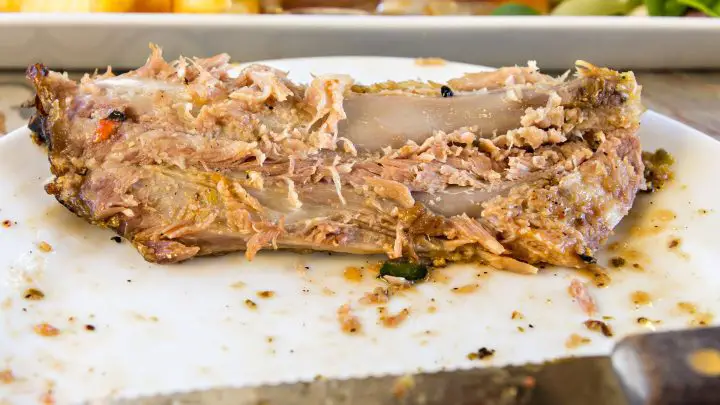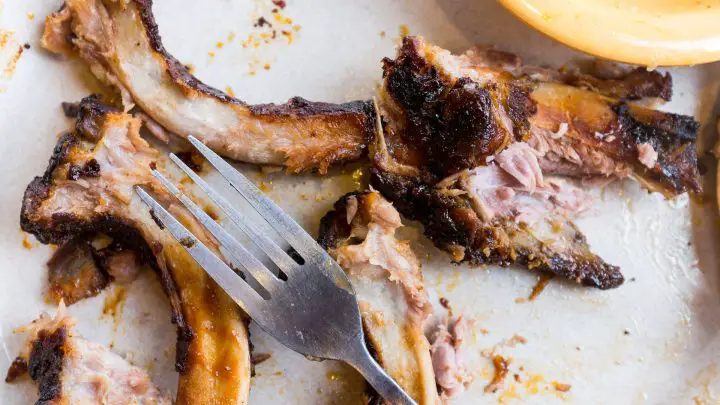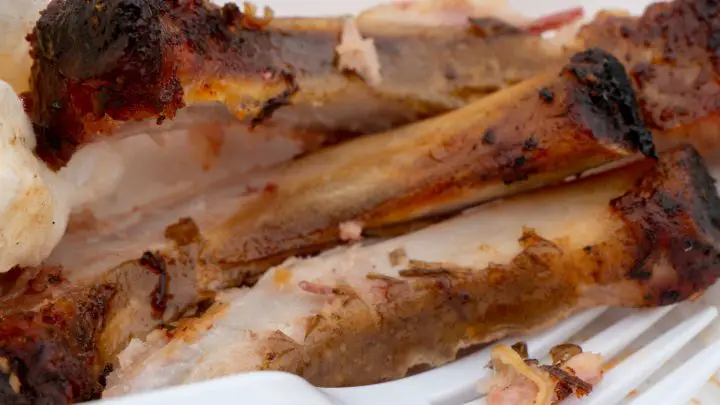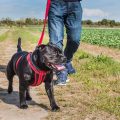Dog ate a rib bone? Showing signs of discomfort and unease? Does your dog just not appear as energetic and spritely as they usually do? Then join us today as we explore how to assess whether or not your dog ate a rib bone, what to do in the event that they have, and how to provide for your dog’s insatiable desire to chew bone matter.

Table of Contents
- Dog and Rib Bone – Caught in the Act
- A Word on Pork
- The Dos of Bones
- Bones for Dogs – Last Bark
- FAQs
Dog and Rib Bone – Caught in the Act
It will be most helpful to you and your dog if you have caught your dog in the act of eating a bone.
First things first. You will want to remove the bone from them and hide it somewhere that they will not be able to find and/or reach.
Almost immediately, you will also want to ensure that they do not still have any smaller bits of bone in their mouth. Open the mouth gently but with enough force. If you deem it safe, try to remove all of the pieces of bone that might remain in there.
Once all sign of the bones has been removed from inside the mouth, make sure that the dog is not choking or gagging. If they are, seek medical attention immediately. Call emergency services so that they can best advise you on what to do.
Often, a dog will be able to deal with this on its own. Though it is best not to take chances with these things.
Signs of Discomfort
Even if the dog appears relatively normal (and is not choking or gagging), you will want to keep an eye out for any signs of discomfort. This is might indicate that the dog is struggling to process whatever pieces of bone it has ingested.
- Vomiting is especially dangerous with bones as the bone could very easily become lodged in the dog’s throat on the way back up, causing suffocation and, in some instances, even death.
- Abdominal pain can be assessed by touching the dog’s stomach and gauging its reaction. If they react in a way indicative of pain, then it is very likely that the bone has become stuck somewhere in the bowel.
- Finding blood in the vomit or poop of your dog can be a very bad sign indeed. Keep an eye out for dark brown or black stools, for these are often the kind that has been contaminated with blood. In such instances, a quick reaction is of the utmost importance to ensure that a dog survives.
- Diarrhea or constipation can be signs of gastrointestinal blockage, especially relevant if a dog has recently swallowed a rib bone, though something to be taken seriously regardless. In these instances, the bone is likely to be stuck in the intestine, meaning that nothing except liquids can pass, hence diarrhea. It can be hard to know what to give a dog for constipation, too.
- A lack of appetite is another sign of a blockage in a dog and should be taken deadly seriously, especially if the dog has been known to have ingested a rib bone recently. This symptom is quite common among a number of other illnesses and conditions including some ongoing infections. Check the dog’s temperature to discern, as an infection will usually cause a fever.
- Lethargy is another sure sign to watch out for. If your dog was once excitable and playful and is no longer, then it may very well be afflicted with something gastrointestinal, inflammatory, or infectious.
The speed with which you react to these symptoms is vital – consult a vet immediately if your dog exhibits one or more of them in rapid succession or simultaneously. How often should you take your pet to the vet? As often as possible!

A Word on Pork
Though all rib bones can cause a dog discomfort in the long and short term, pork rib bones are especially dangerous if consumed regularly.
Compared to most other meats, pork is especially full of fats. This is something that can cause some serious harm to your dog in the long run, particularly to the pancreas.
If indeed your dog ate a rib bone of pork, you would be best advised to seek a vet immediately. The bone itself cause some serious damage to the safe and economical flow of your dog’s innards. The fats within the pork could cause some serious damage too.
While you are at it, why not get your vet to examine the dog fully? This ensures that they are not afflicted with, say, pancreatitis? This is an inflammation of the pancreas as a result of a fatty diet. This is something that can be exacerbated with the consumption of pork rib bone.
Pork, of course, is not inherently harmful to a dog. The ratio of proteins to fats in pork is about 4 to 1. Other meats, like chicken, for example, are a lot leaner, though. Hence the current medical advice around pork is to only feed it to your dog in moderation.
Feeding a dog so much fat on a regular basis can do no good to the dog in question. Besides encouraging the onset of pancreatitis and other organ-specific conditions, foods that are high in fat like this can also thicken the arteries of a dog. This lowers its lifespan considerably.
Heck, even meat as lean as chicken has its own set of problems. The gizzards in chicken, for example, are especially high in cholesterol. They may be fed in moderation.

The Dos of Bones
If you are going to give your dog a bone of any kind, then you will want to follow these key ideas.
Raw Bones
Make sure that the bones you are giving a dog are raw and not cooked.
One of the main issues with giving dogs bones is that they are often cooked bones that humans do not want to eat.
When a bone has been cooked, it is more likely to splinter. It is these razor-sharp bone splinters that can do some lethal damage to a dog’s mouth and innards.
Cow, lamb, and beef bones are ideal for a dog. Chicken, turkey, and pork bones are to be avoided as often as possible.
While raw bones are the optimal choice for a dog, you will still need to ensure that they have been sanitized. This is why antler is often a popular choice for a tough dog chew that will last a while.
Sanitize
As aforementioned, it is best to sanitize a bone before letting a dog consume it. Thankfully, most bones from the pet store have already been sanitized properly and prepared in a way that is safe and resistant to chipping. Some are even filled with a meat or peanut butter paste that is sure to excite them.
Size
A key thing to consider is the size of the bone in relation to the dog in question. It should be big enough that the dog can get a good hold on it with their mouths around. But big enough that there is no chance of the dog accidentally swallowing and choking on it.
Supervise
The best way to make sure that your dog does not choke on a bone is to make that you are supervising it as much as possible.
A dog is often little more than a baby. You would not exactly let a baby go for very long unsupervised, would you?
Chips and shards can come flying off of a bone at any given time. A dog will not know better than to eat them. Removing these chips as soon as possible and discarding a bone as soon as it becomes sharp, brittle, and/or hazardous will save you plenty of grief later down the line.
Similarly, a dog can struggle to know when to stop. If they will not stop chewing a bone after, say, thirty minutes, gently take it away from them. Do so while talking kindly to them and making sure they know they are not in trouble.
If the bone is one that you have fashioned yourself, keep it in the fridge when it is not being used. This is much as you would any other food. It is, after all, from a living thing. This way, you can also make sure the dog does not get any ideas about obtaining the bone without permission.
Bones for Dogs – Last Bark
So, there you have it! Hopefully, you are feeling more clued up on how to deal with a dog that has eaten a rib bone.
Far from being a cautionary tale against bones. Actually, this article should show you that, while dangerous in some instances, bones are good for dogs. If properly prepared, a dog can enjoy a bone free from worry. So long as they are supervised as much as possible.
FAQs
If your dog has ingested a rib bone, monitor them closely for any signs of discomfort, vomiting, lethargy, or changes in appetite or behavior. If you’re concerned, it’s best to consult your veterinarian for guidance.
If you’re considering giving your dog a bone to chew on, it’s important to choose a raw bone that is appropriately sized for your dog’s breed and size. Always supervise your dog closely while they’re chewing, and take the bone away if it starts to break or splinter. It’s also recommended to consult your veterinarian before giving your dog any type of bone.





